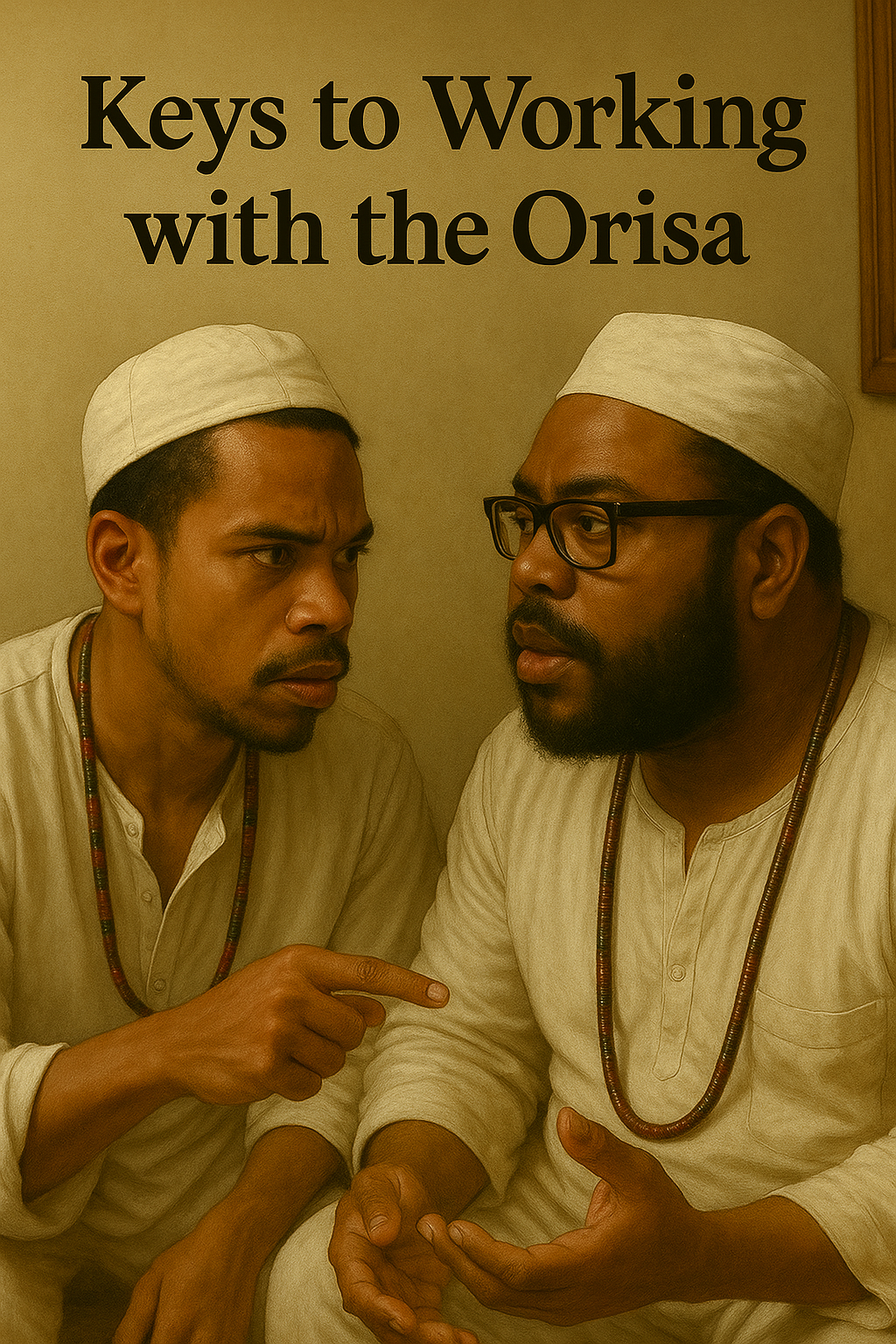
By Monroe Rodriguez & Laurence Pommells
Spiritual paths aren’t paved in gold. They’re carved in bone, memory, blood, and breath. For those walking the ancient roads of Orisa, Vodun, and African traditional practice, the journey is rarely linear. It winds. It tests. It reveals.
This conversation between myself and my colleague Laurence Pommel's marks the beginning of a broader series—real talk between spiritual workers, priests, and initiates across traditions. No performance. No gatekeeping. Just insight, experience, and truth.
Adornment Is Responsibility
Everyone wants the beads. The regalia. The titles. But few understand the weight.
Wearing 15 elekes isn’t a fashion statement—it’s a commitment. It’s years of sacrifice, spiritual maintenance, self discovery and community obligation. These aren’t accessories. They are contracts.
If you’re in this for the aesthetic, the shine will fade. What remains is the work. And the work is not for the faint of heart.
Multiple Traditions, One Destiny
I walk many paths—Ifá, Vodun, Mami Wata, Congo traditions, and others. Not out of spiritual curiosity or eclecticism, but because my ori and ancestral mandate required it.
Some of us are born with ancestral callings too loud to ignore. Dreams that instruct. Spirits that press. And once you say yes to the path, you are no longer your own.
I’ve tried to hide. I’ve tried to isolate. But again and again, I’m pushed forward by spirit—into visibility, into teaching, into uncomfortable truths.
Initiation Is Not Mastery
Initiation grants access. It doesn’t confer wisdom.
We’ve both seen it: long titles, elaborate ceremonies, and yet, no integrity. Some of the most harmful behavior in our traditions comes not from outsiders, but from those who should know better.
Being born into a lineage or memorizing prayers doesn’t make someone righteous. Mastery is evidenced by one’s character, not one’s credentials. And true elevation begins with personal accountability.
Possession Is Not Performance
Let’s speak plainly. Possession is sacred.
It is not a performance for social media. It is not a sideshow.
We’ve seen the real. In Nigeria, I witnessed a woman possessed by Oshun fly across a room with supernatural speed—so fast it defied logic. In Haiti, I was physically knocked down by spirit when I broke a ritual rule.
Possession is not a novelty. It’s a contract between spirit and vessel, and it should be approached with reverence, not theatrics.
Your Ori Comes First.
This cannot be overstated: nothing can bless or harm you without your ori’s permission.
You could possess Ogun’s tools, Shango’s axe, and Obatala’s staff—if your ori is not aligned, you are exposed.
Ori is your inner divinity, your destiny, your protection. It is the first altar, and it governs all others. Appease your ori before approaching any spirit.
Respecting the Diversity of Destinies
Not every initiate has the same path. Your diet is not your student’s. Your spiritual mandates are not your partner’s.
We must stop projecting our expectations onto others.
Spiritual leadership means guidance, not control. Protection, not possession.
Let people walk their road. Correct when necessary—but don’t colonize their journey.
Power Without Character Is Dangerous
Some of the most spiritually knowledgeable people I’ve met have also been the most toxic.
They’ve used spirits to dominate, harm, and manipulate. They’ve thrown graveyard dirt, worked with dark entities, and weaponized their training for ego, not enlightenment.
Let’s be honest: whether you’re a bokor, a palero, a houngan, or a babaláwo—the materials are often the same. Herbs. Animals. Bones. Fire. The difference is intent.
Power without character is simply well-dressed harm.
Dogma Is Not Depth
You will encounter contradiction. You’ll receive different answers from different houses. You’ll see one lineage feed Ogun palm wine and another forbid it.
That doesn’t make either wrong—it makes them regional. The deeper you go, the more you’ll realize there are many right ways.
Truth is not monolithic. It is contextual, ancestral, and alive.
Spiritual Work Is Self-Work
This isn’t costume. This is communion.
Walking with the Orisa is not a performance of piety—it is a process of deep internal alignment. The ceremonies, the readings, the offerings—they are all mirrors, all teachers.
So approach the path with humility. Learn your history. Listen to your ori.
Because in the end, your titles won’t protect you. Your aesthetics won’t save you.
But your alignment just might.